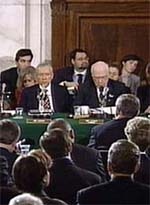
|
Fierce Opposition to Charles Pickering is Reaffirmed by HRC Mississippi Friend of Trent Lott Called Hostile to Civil Rights Human Rights Campaign
As a community often targeted for hate violence, HRC is particularly concerned about Pickering's handling of a 1994 Justice Department hate crime incident involving three men who burned an 8-foot cross on the lawn of an interracial family while using racial epithets. The family had been a frequent target of harassment in their small rural town, including having bullets fired into their home and "KKK" painted nearby on the street. Nonetheless, when sentencing one of the defendants, Pickering gave what was considered a lenient sentence for the cross-burning, in order to "make the punishment commensurate with the drunken prank that I think it was, even though it did have racial overtones." Clearly, the most serious misgivings about Pickering stem from his problematic record on race relations. Pickering's legal career began with a law review article suggesting ways that the state could amend its miscegenation statute to ensure it would be found constitutional and enforceable. Although that article was published in the 1950s, his record as a Mississippi state senator and federal district court judge in no way redeems him, says HRC. "His record as a legislator and judge manifests a profound disdain for basic civil rights and constitutional protections that categorically disqualifies him from elevation to the 5th Circuit," said Stachelberg. As a Mississippi state senator in 1975, Pickering co-sponsored a Senate resolution calling on Congress to repeal Section 5 of the Voting Rights Act, which requires federal pre-clearance of changes to voting procedures by jurisdictions with a history of discriminatory voting practices. As a judge, Pickering criticized the Voting Rights Act, and the "one person, one vote" principle, which calls for numerical parity among voting districts to ensure the equality of voters across districts. Although the Supreme Court affirmed this principle under the 14th Amendment, Pickering called it "obtrusive." Pickering's judicial record also repeatedly manifests his hostility toward employment non-discrimination laws, including Title VII of the Civil Rights Act of 1964. He has generally given short shrift to employment discrimination plaintiffs, almost always granting summary judgment for employers, thereby refusing plaintiffs' arguments to be considered by a jury. In several cases, Pickering went so far as to scold the plaintiff for even bringing a Title VII claim. For example, in the sex discrimination case Thornton v. Gordon Walker, Pickering granted summary judgment to the defendant while belittling the plaintiff, quipping, "Some seem to think that every time an adverse employment action is taken against one protected by Title VII that a discrimination has occurred and an action can be brought...." Pickering also has been reversed on numerous occasions by the conservative 5th Circuit Court of Appeals for disregarding precedent on constitutional rights and for denying individuals access to the courts. As one of many available examples, the 5th Circuit in 2001 reversed as "unfair" and "unreasonable" Pickering's decision in U.S. v. Nix, in which he rejected a defendant's notice of appeal on a technicality. "The federal courts have the important role in our democracy of protecting the Constitution," said Stachelberg. "For the vast majority of litigants, the circuit courts of appeal serve as the final line of defense against violations of the Constitution and our nation's civil rights laws. So the totality of this record raises grave concerns and serious doubts about Judge Pickering's judicial temperament and suitability for elevation to the 5th Circuit Court of Appeals." The original nomination of Pickering was rejected in March by the Senate Judiciary Committee along party lines, mainly out of concern over his record on civil rights. |
 The Senate Judiciary Committee, led by Chairman Orin Hatch (left) and Ranking Member Pat Leahy, will once again review the nomination of conservative judge Charles Pickering. Pickering's nomination was rejected while Leahy headed the committee in 2002.
The Senate Judiciary Committee, led by Chairman Orin Hatch (left) and Ranking Member Pat Leahy, will once again review the nomination of conservative judge Charles Pickering. Pickering's nomination was rejected while Leahy headed the committee in 2002.